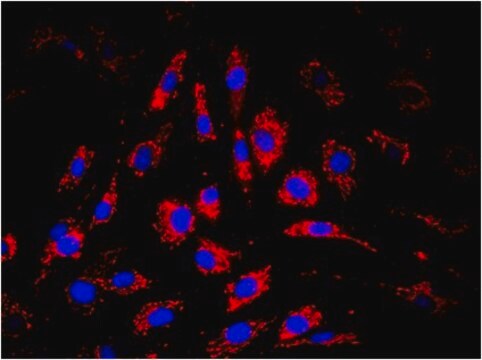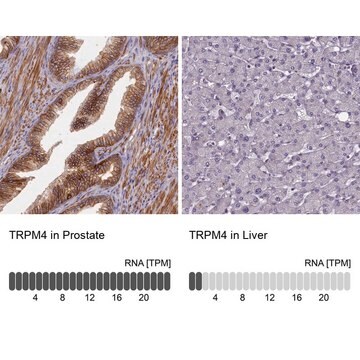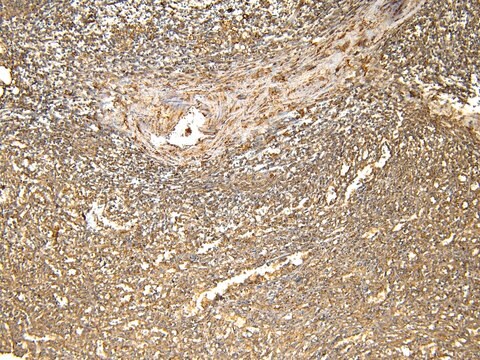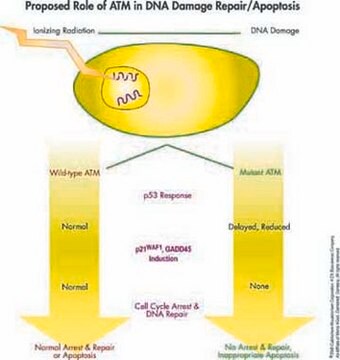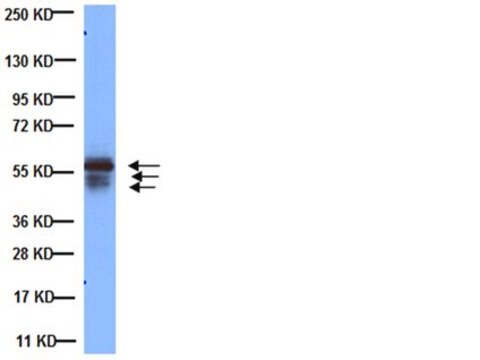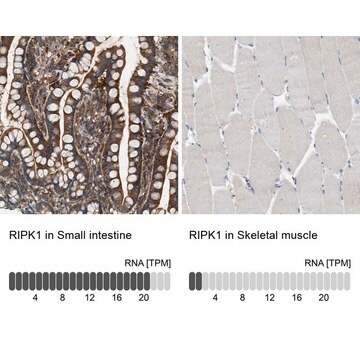MABN2635
Anti-Mitochondrial ferritin/FTMT Antibody, clone C65-2
About This Item
Recommended Products
biological source
mouse
Quality Level
conjugate
unconjugated
antibody form
purified antibody
antibody product type
primary antibodies, primary antibodies
clone
C65-2, monoclonal
mol wt
calculated mol wt 27.54 kDa
observed mol wt ~29 kDa
purified by
using protein G
species reactivity
human, monkey
packaging
antibody small pack of 100 μg
technique(s)
immunofluorescence: suitable
immunohistochemistry (formalin-fixed, paraffin-embedded sections): suitable
western blot: suitable
isotype
IgMκ
epitope sequence
C-terminal
Protein ID accession no.
UniProt accession no.
shipped in
ambient
target post-translational modification
unmodified
Gene Information
human ... FTMT(94033)
Related Categories
General description
Specificity
Immunogen
Application
Evaluated by Western Blotting in lysates from HEK293 cells overexpressing Ferritin mitochondrial (FTMT).
Western Blotting Analysis (WB): A 1:250 dilution of this antibody detected Ferritin, mitochondrial (FTMT) in lysate from HEK293 cells overexpressing FTMT.
Tested Applications
Immunohistochemistry Applications: A representative lot detected Mitochondrial ferritin/FTMT in Immunohistochemistry applications (Yang, M., et al. (2017). Acta Histochem Cytochem. 50(1):49-55).
Western Blotting Analysis: A representative lot detected Mitochondrial ferritin/FTMT in Western Blotting applications (Yang, M., et al. (2017). Acta Histochem Cytochem. 50(1):49-55).
Immunofluorescence Analysis: A representative lot detected Mitochondrial ferritin/FTMT in Immunofluorescence applications (Yang, M., et al. (2017). Acta Histochem Cytochem. 50(1):49-55).
Note: Actual optimal working dilutions must be determined by end user as specimens, and experimental conditions may vary with the end user
Physical form
Storage and Stability
Other Notes
Disclaimer
Storage Class Code
12 - Non Combustible Liquids
WGK
WGK 1
Flash Point(F)
Not applicable
Flash Point(C)
Not applicable
Regulatory Listings
Regulatory Listings are mainly provided for chemical products. Only limited information can be provided here for non-chemical products. No entry means none of the components are listed. It is the user’s obligation to ensure the safe and legal use of the product.
JAN Code
MABN2635-100UG:
MABN2635-25UG:
Certificates of Analysis (COA)
Search for Certificates of Analysis (COA) by entering the products Lot/Batch Number. Lot and Batch Numbers can be found on a product’s label following the words ‘Lot’ or ‘Batch’.
Already Own This Product?
Find documentation for the products that you have recently purchased in the Document Library.
Our team of scientists has experience in all areas of research including Life Science, Material Science, Chemical Synthesis, Chromatography, Analytical and many others.
Contact Technical Service